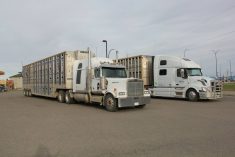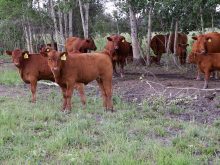Writing a mission statement on a website is easy.
Acting on that mission statement is hard.
The leaders of the Manitoba Beef and Forage Initiatives (MBFI), a partnership of Manitoba Agriculture, Manitoba Beef Producers, Ducks Unlimited and the Manitoba Forage and Grasslands Association, have moved beyond the talk and are now acting on the hard part.
Later this summer the MBFI will open a learning centre near Brookdale, Man., north of Brandon, to advance its mission of science-based research to “benefit valuable ecosystems, improve producer profitability and build social awareness around the beef and forage industry.”
Read Also

August rain welcome, but offered limited relief
Increased precipitation in August aids farmers prior to harvest in southern prairies of Canada.
“The addition of the Learning Centre to MBFI represents an incredible opportunity for MBFI to shine,” said Ramona Blyth, a cattle producer from MacGregor and MBFI chair.
“It (will add) huge value to Manitoba, especially western Manitoba, as a place for producers, industry leaders and the general public to learn about and showcase beef and forage research, on farm innovation and beneficial practices and agriculture as a whole.”
The learning centre will have a 2,200 sq. foot indoor classroom and outdoor facilities where visitors can get close to livestock on the research farm.
“You can take your theoretical in the classroom … and walk over to the livestock handling centre and meet with various animal experts (to) have a hands-on experience,” said Glenn Friesen, industry development specialist for forages with Manitoba Agriculture.
For the last few years, MBFI has conducted farm-scale research near Brookdale, Man., at a site formerly operated by the Manitoba Zero Tillage Research Association.
Scientists have used the farm to study things like extended grazing, poly-cropping and energy dense annual forages.
“We look at the innovative practices on livestock and forage production or beef and annual crop production,” Friesen said. “We’re heavy on cattle … but the subjects we talk about get into all the things around water quality, biodiversity.… Soil health is a topic we talk about there a lot.”
The new learning centre will serve as an extension site, to share on-farm research and encourage more farmers to adopt best practices.
The research activity at the MBFI site could be described as regenerative agriculture, using tools like cover crops, minimal tillage and grazing practices that improve soil health, with the larger goal of reducing inputs and increasing profitability.
The MBFI is hosting a regenerative agriculture conference this fall in Brandon, but Friesen said that’s not the mandate of the research farm.
“I wouldn’t use the word ‘regenerative’. ” Not that we don’t like it … but the MBFI, its goal is to provide science-based information to improve profitability and environmental sustainability and social awareness of agriculture.”
The learning centre will also be used as a site for public engagement, to talk about things like growth hormones for cattle production or livestock and greenhouse gas emissions.
“(To) provide a venue where we can connect with the next generation of consumers and producers,” Friesen said. “All those hot button issues. We want to be able to speak about them and share the science.”
The MBFI plans to host a grand opening for the learning centre, likely in late August.















